
The Linz Cassette Culture Node exhibition will get a follow-up this spring, 2019, in Vienna, end of May, then running for 4 weeks, daily from 9 to 4. Location: Druckerei Resch, Rosinagasse 19, 1150 Vienna, Austria ...
19 min read 🤓
CCNL :: Cassette Culture in Linz, Austria
[i] Oral history
january 18, 2019
« I decided to be an artist
because I like to express myself! »
(Found Tape 427A, fotex 77)
Right in the middle of both the last year's world soccer cup tournament and the yearly Vieux Media Fest in La Générale in Paris, WeiWei and me flew over to Linz, Austria, to join Wolfgang 'Fadi' Dorninger for the third and final week of his crowdfunded Cassette Culture Node.Linz exhibition, wonderfully set up in the Ursulinenhof Foyer on the OK Platz, in the OÖ Kulturquartier, the cultural heart of the city of Linz, whose glass wall for the occasion had been decorated by a couple of thousand covers of DIY cassette releases, mainly from the eighties and nineties.
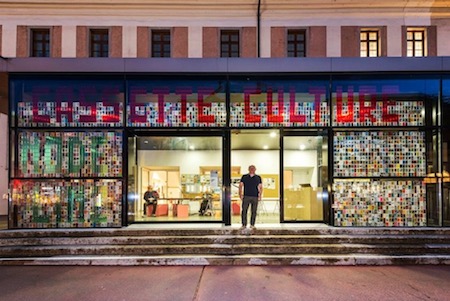
Exposed behind this absolutely stunning façade was a carefully arranged selection from a large archive of DIY audio releases, WWCC—(world wide cassette culture)—snail mail exchanges, thoughtfully handcrafted editions of passionately assembled fanzines that aired and worded the, in hindsight, surprisingly unanimous and coherent (†) musical and artistic interests of a predominantly non-academic, pre-WWW and pre-digital network of 'underground' & 'fringe' artists, who experimented new directions in musical ('folk') expression using the novel cheap means for producing and recording, publishing and distributing (mainly electric 'n' electronic) music and media-art, means that had become readily available at affordable prices because of ongoing advances in audio & related technologies, boosted by the unstoppable capitalist spook urging all and everyone to, by all means, consume. ( * ). It is a network that found its earliest roots in Fluxus and Fluxus related mail art movement(s) in the 1960's, and continued to expand over the 1970's and 1980's, growing and connecting local nodes all over the globe.
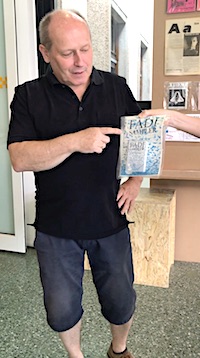 |
Wolfgang's involvement in cassette culture goes back to the early 1980's, when —in 1983— he began the Die Ind cassette label, and de facto pinned the Austrian city of Linz within the dynamic set of nodes that, linked through the exchange of very physical snail mail packages (containing cassettes, letters, collages, drawings, fanzines and the occasional vinyl release) and physical voyages, together formed a global network of CC (cassette culture) and DIY artists. For the full three weeks of the exhibition, he actually was a living part of it, being there every day during opening hours to communicate, to orally, physically, in person, transmit stories, anecdotes, jokes, facts, all originating in this little but utterly fascinating part of the past decades of our cultural history —basically, we're talking here about the late 1970's, the 1980's and the early 1990's.
This daily communication, this oral history, these stories were the most ephemeral, of course, but arguably also the most valuable parts of the CCNL events and exhibition in the Linzer Ursulinenhof Foyer, that opened on June 21st and continued until July 14th.
I for one loved all of it, and am awfully glad having been able to document, in what follows, at least parts of it.
So did Rinus van Alebeek, who was in Linz from June 24th until 30th, on the occasion of which, among many other things (like working on a second edition of his first release at Staaltape, the "Berlin Tape Run" from 2009) he recorded —on a cassette dictaphone— a one hour Letter from Linz, with many of Wolfgang's stories, and reflections on 'fringe' and 'underground' music production, networks and —artistic and other— communication, as it was then, and as it became in the age of internet and lightning fast world wide and increasingly AI-'powered' (anti-)social media. Rinus' Letter from Linz was (and is) broadcast on Radio On Berlin, but it is also available, in digital format, for streaming and download at Bandcamp's.
Rinus's audio letter and the text and video clip that follow below, in some parts obviously overlap, but they also complement one another. The words and images that follow resulted from one of the very first actions that Yungwei and me undertook after having arrived in Linz, which was a live FB-video connection on late Sunday afternoon with the Vieux Media Fest that simultaneously happened at La Générale in Paris. The connection passed via my iPhone, with which I filmed the surroundings, the exhibits, and Wolfgang who gave us a tour of the exhibition, talking about the cassette and fanzine networks, and about how this exhibition came about.
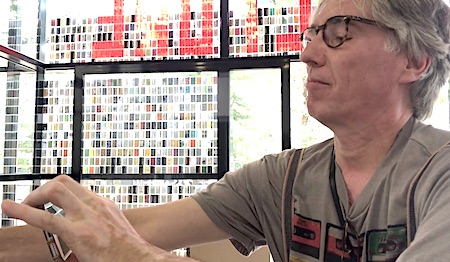
All of that, in turn, was —a sign of these times of ubiquitous massive data gathering— filmed by Yungwei on her iPhone. These smart-phone captured recordings were the source for all the follows below.
...
WD = Wolfgang Dorninger ; HS = Harold Schellinx
(The texts are very literal and near to unedited transcriptions of the audio on the video clips recorded by Yungwei Chen.)
...
Artistic loneliness
[WD] —“I went into this network because of totally artistic loneliness. When I started, in 1983, 1984, I was totally lonely in this town, I had no one I could express my ideas, I had no one to discuss about the quality of what I'm doing, and when I played the first show, most of the people got totally destroyed, and said, "What is this??"... ”
[laughs]
“But this was not the main problem, the main problem was that at the end no one was talking to me. They just had been a little bit disturbed and then went away and that's all. So, I felt like so many people who feel now, if they come from somewhere, stay around and, people let them stay around and, that's it. So I was just like a lonely person, and then I went into this network, and everything changed dramatically.
I got real feedback, I got real interest in what I'm doing, I realised that so many people make stuff like I do! And I saw that it is a total rich field, and this was my thing, so... And that's what I want to show here, that's why I'm here, every day, to say, "this was my situation, this happened and it was my university and at the end I could say that I maybe got more out of this movement than of the university ... ”
The fire police
“I never had the ambition to become something like the curator of an exhibition. This happened by accident because the fire police came into our house to control if everything in terms of security is fine. And beyond the roof in the attic these guys saw about forty boxes, and they said, "What's this? What's in there?" So we opened a box and it was full of fanzines, we opened another one, full of folders, full with letters, this was all full just with stuff that I collected during the time that I did the label. And then he said: "This has to be ... OUT!" ...”
“I put everything into the garage, and so last summer I was sitting there, and I said, "OK, I'll get rid of 80%, and for the remaining 20%, I will find a place. A good place, something like a tape shrine." ...”
[laughs]
“And when I went through this material, I realised that there was so much critical and also artistic great input in all this kinds of communication, sound art, media, in this archive, that I thought, I have to do something with it. For example, I found letters where one person, a customer, sent me a review over two pages on my last cassette, and I sat there and said, "Hey, this is in no fanzine, this is just one person writes me a review!" And I was sitting there and said, "What did I get the last ten years?" ...”
Saved from the shredder
“I got some well done's 👍 on Facebook, yeah ... that's what I got, and that's all. That's all! We have all these smart media, and we act like primitives, ja! We just act like, eh, like, like... nothing. And I found more of these letters, I found hundreds of these letters, some of them four pages long, some of them three pages, and every letter in there was something really strong and I have to do something, the letters have been the thing. And then I went to the music and then I realised, "Wow, there is so much stuff on it, which is still fresh and vital, so... and then I found the flyers, I found the aesthetics, I said, "I have to do something with this before I kick most of the stuff into the shredder. And, so, I didn't know if this... I was frightened about nostalgia. So I thought, eh, "I do a crowdfunding, and when I get the level and know that I am not having a loop in nostalgia..." And then, OK, I made the cut, so I had to do an exhibition. I collected out of the bunch of material stuff that I thought is interesting for an audience. I didn't want to make an exhibition for nerds, so that five people show up and go through and know everything and say, "Well done!"...” 👍
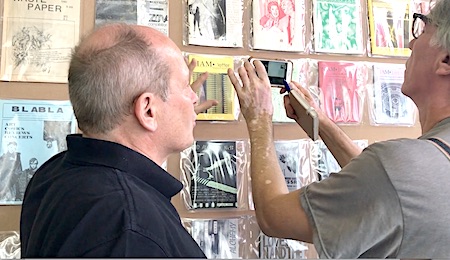
Cassettes everywhere
“I wanted to make an exhibition where people come in and eh can create their own personal story, because everyone had to do with cassettes in a certain way. In every house, in every kitchen, in every car, everywhere there was a cassette player, so I also wanted to have it visible, I wanted to do an exhibition which tells a story, which is also interesting for non-nerds. The only thing I said I will do it was, "I'm there, three weeks, every opening date during opening hours, and I am telling people the story of these days and what I learned from it." And I learned a bunch, because with bands like Monochrome Bleu and Joseph K. Noyce I travelled through this networks five times to the USA, I travelled up to Holland, to Belgium, down to Italy, to Hungary, and eh I got all these experiences of different forms of organisation, of underground, different forms of how these people work together, collaborate, so for me this was kind of university, so I said, "If I'm in here, and young people come in, and say, 'Hey I'm so bored about the situation, what did you do in this analog network?', so I can tell me what we do, and I just can tell them, OK, we spent a lot of time, we just connected to people we..." ... ”
A bed, some food & the city
“For example, I just connected to people I liked the music, that was the main thing, I liked their standing, I liked the way they thought about what they did, and then we communicated on a very intense level, on high respect, and eh we helped us out on each levels. If someone needed help of me, he got help. If someone needed a place on his trips through Europe where he could stay for some days, I gave a bed, food, and I showed them the city and I connected these people to friends of mine who did music or art, whatever, just to show the environment I live in and work in... ”
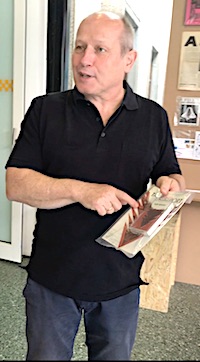 |
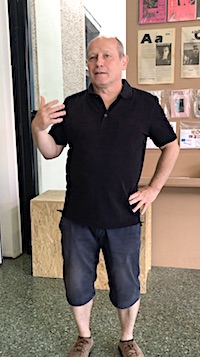 |
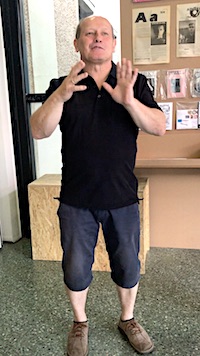 |
Die Ind
“The label was mainly... there have been two series on this label, one was the local fanzine for Linz, I started this compilation series in 1984, and it happened five times. Always in December I released a cassette with a poster or with a booklet or with a folder just in a box with stuff of local bands, and I only invited bands who had not been on a commercial trip or, say, were underground. And the sound was totally unimportant. It could be experimental jazz, it could be hardcore, it could have been electronic music. So I did not care about the style. I took care about what's the attitude of the people, and everyone had to play live at this night of the presentation, because I wanted that all musicians get to know each other, so that they met each other, so that they could get into contact, they could work out maybe future projects. And many different new projects started after the Fadi The Sampler party, because people just met there...”
[HS] —“So the networking, the réseau as they say in French, that was the important thing ...”
[WD] —“Yes, before I was so frustrated because all the musicians went through town like this, like "I'm the jazz guy, I can read notes and play everything..." and the hardcore guys just like "fuck you, fuck you" ... Well, maybe they were not really like this, but I became the person who connected all of them. And this was good, because after this a lot of productive stuff happened.
And then I had a second series of compilations, the Tape Report, this was a booklet with a tape, and the idea behind was to bring stuff I love together on one compilation, with articles on it, I wanted to promote the music that I loved out of this scene, out of the cassette culture, because most of the stuff I loved, not that many people loved. And because I'm in style open, I also had on the same cassette people like Jon Rose from Australia who was a violin player with a very experimental style, and the same compilation had noise stuff on it, like Viscera, or some hardcore stuff. So, in terms of this, many people didn't like the series, because ... for example, if you're a real industrial head, this is too open. If I would have made a pure industrial tape, you would have this very small range in sound and aesthetics. But I liked to have something much wider and more open, and if a part missed, it was on the next one. This is my way of thinking, and getting in touch with music. I just did what I wanted to do.”
Cassette Freedom
“Cassette gave me the freedom, because the investment of money was so low. If I would have done that with, for example, the vinyl format, I would not have done that radical. Because then I would have thought, "OK, I have to sell these 1000 ..." ... With the Tape Report I made 300 booklets, and I started to copy 50 cassettes. And when these 50 had been sold, I copied another 20, and another 20... and look, about 40 booklets of each Tape Report, Nr. 4, it's from 1987, I have, for example a band from Eastern Berlin on it, Fett, who weren't allowed to play in East Germany, because they didn't got the paper. In Eastern Germany you had to make a kind of school or test, and when they said, "OK, the test is done, is good", then you got a license that you could play live. And this band never got the license, but they played a lot live, and sometime went to jail.
The singer was a poet and writer and, eh ... it was always hard to get music from them. So friends of the band from Western Berlin had to bring the tapes out and bring the stuff into Eastern Berlin. And then they kicked him out in 1988, and a week later he showed up in Linz and said, "Hey, I'm here!", and I said, "Great! What did they do?"
—"They kicked me out!"
And I said: "Great, let's have a beer!"
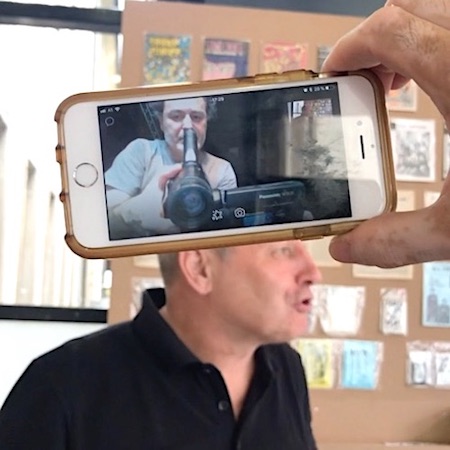
So this Tape Report compilation, I released six of them ... There were still original copies of the booklet, and I found the master tapes, so I could re-make the cassette ...”
[HS] —“You kept a great archive... ! You're better than me, haha! ... So this is from 1987, 1988 ... But then at some point you stopped... Why?”
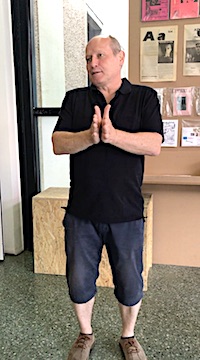 |
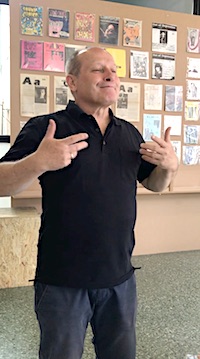 |
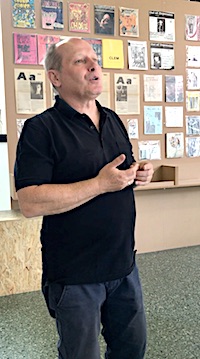 |
Out of time
[WD] —“I stopped with the Tape Report in 1990. I ran out of time. I went from Linz to Vienna to start to study visual media communication at the Hochschule für Angewandte Kunst, so I went to Vienna, and I got new interests, like video animation, 3D stuff, Silicon Graphics machines, and I lost a little bit the key to the music. I played live, but not that many as before. I forgot this... I lost this energy, in permanent networking. Before I got all the parcels and packages, I opened them, I listened to the music, I felt in love with the music, I had to write a letter back, I put in a tape of mine, always in perfect relationship to what I've listened before, I sent... and the next day it was at the Post Office and it took the way somewhere to Japan or to USA or to the UK or wherever. So, in terms of this, this was my life, everything concentrated on this incoming information and my outgoing information. In between I did my recording sessions. Also my recording sessions changed totally, the longer I was in this network.
Because at the beginning we had been totally eh, we did freaked out stuff. I started ... my music started ... I'm, I'm ... the basis of my musical thinking is classical music. I grew up with classical music, I was in a choir, singing from sheet music, so I was alto voice, so, as an alto you always had to be really precise, because we only had five or six alto's in a sixty persons choir. Eh, so I was one of these young trained guys ... "dè, da, díi, da ..." ... always totally precise. And eh when my voice broke I went out of this choir, and this was good, because eh I got in touch with different music.”
[laughs]
“And most of it was neue Musik, and was stuff which came from England like all this eh Henry Cow, all this Rock In Opposition stuff, because of different reasons, maybe because I loved the voice of Dagmar Krause, maybe it was just because the arrangements had been quite interesting for me, but ... eh ... the idea to create music of myself started with the Residents and started with electronic music I got in contact with.”
Cassette Only
[WD] —“My first set-up was only with cassettes. I had three cassette players, such those who mothers and grandmothers used in their kitchen. Just, just normal tools, nothing hifi, nothing great, very cheap. I opened them, I changed the, the plastic parts in there, I changed the tape run, I worked around with the electricity so that they had half speed or stuff like this, I soldered my own reverbs, distortion parts, so I had my little set-up and, so, my music was like a mixture of distorted pulsions and eruptions. The idea was to do something which is really punk. And for me this was punk. But punks never let me play. They never let me be punk. I also had a guitar, so they said, "Hey, play with the guitar!" But, "No! The guitar is for something different!"”
“So I had this stuff... But then it changed when I bought my first MS20, by Korg, when I bought the 606... Then I realised that it's getting more and more a Kraftwerk-thing. And the kind of techno-thing. I've listened to recordings I've done in '83, early '84, and they sound like minimal techno from five, six years ago, so... but with a lot of melody in there, which is not in this kind of minimal techno, so it was totally... eh... it became a change from the tape manipulation to the synthesizer I become more... again more the victim of... eh notes, [laughs] , melody, and this was not that good but eh so I had to change again dramatically and say, my musical focus is on experimental stuff, but eh, it was funny because with Monochrome Bleu the band I started, we started really experimental and we became more and more a popband because the band members went there. But then the band, wrffff..., faded out. For me it faded out by nature, because we left our ... our core, and eh... so this happened in this kind of cassette culture time. So I had this music, I had my live playing and I had the cassettes. And when I started first the cassette productions, they had been more arranged like eh like albums like on vinyl. But the longer I stayed in this network the more I realised that I also could work different. For example, for a New York label, I made a Joseph K. Noyce tape, totally different. I prepared everything during the week and then eh on Saturday I put a reel tape, an empty, into my eh into my Revox, I dressed, and then I started to jam, thirty minutes. And I did it three, four times, and then I felt, "this was a perfect track", and then, this was side A. Then I prepared everything for Sunday. Sunday I put in a new tape, reel tape, did the same. After the third or fourth or fifth or second try it worked out. And this was the B side. On Monday I made the master tape, and sent it to the label in New York. And two weeks later the album arrived. This became more and more my method of working. Not to work on single tunes and put them into, on a chain. It was more to tell broader stories between noise, singing, structures, totally different stuff. And this had been results out of this influences out of eh the incoming eh inspiration I got through media of tapes, media out of the fanzines, and so on ...”
[WD] —“... I show you some stuff ...”
(The following short uTube compiles the remaining of the clips that were recorded by Yungwei Chen on het iPhone. Here Wolfgang takes us on a short tour of the graphics, the audio cassettes, the fanzines and the letters that were on view in the Ursulinenhof Foyer.)
“ ... the file has no future,
because it has no history ”
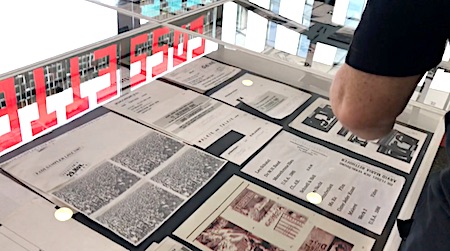
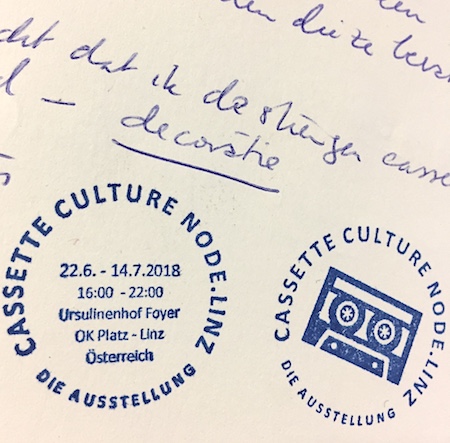
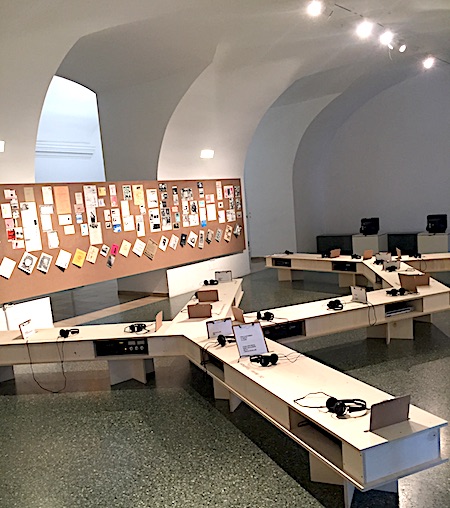
notes __ ::
(†) Much of it, indeed, was rooted in and inspired by the Western capitalist post-war artistic avant-garde. [
^ ]
(*) Let's not forget that the steadily expanding group of 'fringe' music (and, more generally, art) makers and producers (frightening as it may be: there are many millions of 'artists' in this world :) is also (and maybe first of all) an avid group of consumers of (art-and-)music-making & recording technology ...[
^ ]

tags: cassette culture, Linz, CCNL
# .485.
Read all about Found Tapes, Foundtaping and Audio Cassettes (K7s) on the SoundBlog:
(2023, september 21) - Holland[s] Spoor
(2022, january 11) - 'The Art of K7', vol. 1
(2021, september 11) - The Art of K7 :: Sudokaising [ii] Time Folds
(2020, march 21) - The Art of K7 :: Sudokaising [i]
(2019, november 17) - Foundtapers & Foundtaping in Porto
(2019, februay 08) - CCNL :: Cassette Culture in Linz, Austria
[ii] The aesthetics of erasure
(2019, januay 18) - CCNL :: Cassette Culture in Linz, Austria
[i] Oral history
(2015, november 22) - Situasonnisme: the City Sonic Festival
(2014, june 19) - Lecture de Cassette
(2013, october 25) - The Art of K7 (prelude) [sketch/book, 1]
(2013, march 23) - "Ma première cassette était vierge..." Mourning & celebrating 50 years of compact cassette
(2012, july 26) - UnOfficial Release
(2010, november 28) - Foundtaping, Maps & Shadows
at the Basel Shift Festival (i.)
(2009, november 15) - prof. dr. Cassette
(2009, november 08) - A found tapes meta-map
(2009, october 22) - Founded Tapapes
(2009, september 20) - Found Lost Sound
(2009, july 26) - "You, a bed, the sea ..." [ 1. Athens, sept. 28th 1994 ]
(2009, may 23) - It feels like summer in the city [KT2009, i]
(2009, february 19) - Time and the weather - "? Footage or Fetish" @ Käämer 12, Brussels (ii)
(2009, january 30) - A Tingel Tangle Tape Machine - "? Footage or Fetish" @ Käämer 12, Brussels (i)
(2009, january 15) - Kassettenkopf
(2008, december 08) - un-Tuned City (foundtaping in Neukölln)
(2008, september 14) - Psycho/Geo/Conflux in Brooklyn, NY __i.
(2008, august 31) - " Le chasseur " (foundtaping in brussels_ii)
(2008, june 18) - "Sing Laping, Sing !" (foundtaping in brussels_ i)
(2008, january 06) - Mo' Better Mo-Tapemosphere, 2. Restmuell
(2007, june 16) - Mo' Better Mo-Tapemosphere, 1. "chase away all my fear"
(2007, march 07) - Back to Berlin 2. Found Tapes
(2006, september 28) - jenny likes poets
(2006, september 06) - the sound of almost-no-more words
(2006, june 13) - fotex #49-51
(2006, june 04) - Sonofakunsttoer
(2006, april 17-25) - 'sudoku-solution' in 'de nor'
(2006, january 19) - ride, buggy, ride ... !
(2006, january 13) - axiologie for dummies
(2005, november 06) - found in maastricht
(2005, august 28) - tête-de-tettine / tête-de-cassette
(2005, august 23) - tape busters and coordinates
(2005, july 02) - Conquering America ...
(2005, june 03) - stationed soother
(2005, april 21) - Low-fi : the new Readymades
(2005, march 24) - d_Revolution #1 ...
(2005, february 07) - found tapes for spies
(2005, january 28) - "parfois l'amour tourne à l'obsession ..."
(2004, november 06) - à la tranquilité
(2004, july 20) - instructions in arabic
(2004, may 08) - phound stufphs
(2003, august 04) - new acquisitions #7, #8
(2003, may 04) - r2r
(2003, april 24) - splice and tape
(2003, april 15) - new acquisitions #5,#6
(2003, january 09) - finders keepers
(2002, november 24) - exhibit #4
(2002, november 08) - what fascinates me
(2002, november 07) - more on found tape montage
(2002, september 14) - detour
(2002, september 09) - 2 down, 3 to go
(2002, september 06) - magnetic migration
Read about Found Tapes in Gonzo (Circus) [Dutch]:
Gonzo #163, mei/juni 2021 - Lang Leve Lou Ottens
Gonzo #137, januari/februari 2017 - Het Kaf en het Koren